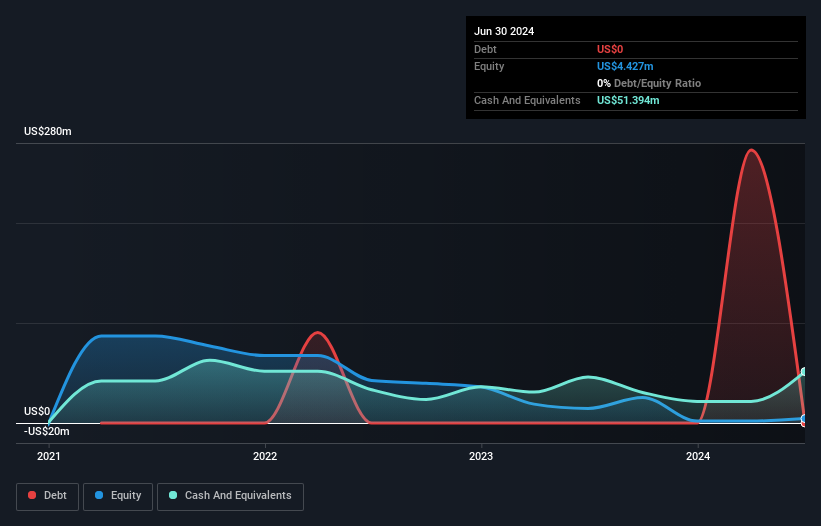We're Not Very Worried About Fly Play hf's (ICE:PLAY) Cash Burn Rate

There's no doubt that money can be made by owning shares of unprofitable businesses. For example, although Amazon.com made losses for many years after listing, if you had bought and held the shares since 1999, you would have made a fortune. But while the successes are well known, investors should not ignore the very many unprofitable companies that simply burn through all their cash and collapse.
So, the natural question for Fly Play hf (ICE:PLAY) shareholders is whether they should be concerned by its rate of cash burn. For the purpose of this article, we'll define cash burn as the amount of cash the company is spending each year to fund its growth (also called its negative free cash flow). First, we'll determine its cash runway by comparing its cash burn with its cash reserves.
See our latest analysis for Fly Play hf
How Long Is Fly Play hf's Cash Runway?
A company's cash runway is the amount of time it would take to burn through its cash reserves at its current cash burn rate. In June 2024, Fly Play hf had US$51m in cash, and was debt-free. Looking at the last year, the company burnt through US$19m. That means it had a cash runway of about 2.7 years as of June 2024. That's decent, giving the company a couple years to develop its business. The image below shows how its cash balance has been changing over the last few years.

Is Fly Play hf's Revenue Growing?
We're hesitant to extrapolate on the recent trend to assess its cash burn, because Fly Play hf actually had positive free cash flow last year, so operating revenue growth is probably our best bet to measure, right now. Notably, its strong revenue growth of 52% over the last year is genuinely cause for optimism. In reality, this article only makes a short study of the company's growth data. This graph of historic revenue growth shows how Fly Play hf is building its business over time.
Can Fly Play hf Raise More Cash Easily?
There's no doubt Fly Play hf's revenue growth is impressive but even if it's only hypothetical, it's always worth asking how easily it could raise more money to fund further growth. Issuing new shares, or taking on debt, are the most common ways for a listed company to raise more money for its business. One of the main advantages held by publicly listed companies is that they can sell shares to investors to raise cash and fund growth. By comparing a company's annual cash burn to its total market capitalisation, we can estimate roughly how many shares it would have to issue in order to run the company for another year (at the same burn rate).
Since it has a market capitalisation of US$22m, Fly Play hf's US$19m in cash burn equates to about 85% of its market value. That suggests the company may have some funding difficulties, and we'd be very wary of the stock.
How Risky Is Fly Play hf's Cash Burn Situation?
Even though its cash burn relative to its market cap makes us a little nervous, we are compelled to mention that we thought Fly Play hf's revenue growth was relatively promising. Cash burning companies are always on the riskier side of things, but after considering all of the factors discussed in this short piece, we're not too worried about its rate of cash burn. On another note, Fly Play hf has 4 warning signs (and 3 which make us uncomfortable) we think you should know about.
If you would prefer to check out another company with better fundamentals, then do not miss this free list of interesting companies, that have HIGH return on equity and low debt or this list of stocks which are all forecast to grow.
New: AI Stock Screener & Alerts
Our new AI Stock Screener scans the market every day to uncover opportunities.
• Dividend Powerhouses (3%+ Yield)
• Undervalued Small Caps with Insider Buying
• High growth Tech and AI Companies
Or build your own from over 50 metrics.
Have feedback on this article? Concerned about the content? Get in touch with us directly. Alternatively, email editorial-team (at) simplywallst.com.
This article by Simply Wall St is general in nature. We provide commentary based on historical data and analyst forecasts only using an unbiased methodology and our articles are not intended to be financial advice. It does not constitute a recommendation to buy or sell any stock, and does not take account of your objectives, or your financial situation. We aim to bring you long-term focused analysis driven by fundamental data. Note that our analysis may not factor in the latest price-sensitive company announcements or qualitative material. Simply Wall St has no position in any stocks mentioned.
About ICSE:PLAY
Moderate with mediocre balance sheet.
Market Insights
Community Narratives




